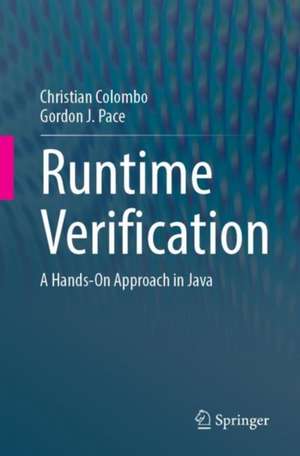Runtime Verification: A Hands-On Approach in Java
Autor Christian Colombo, Gordon J. Paceen Limba Engleză Paperback – 13 iul 2022
Drawing from years of the authors' real-world experience, the reader progresses from manually writing runtime verification code to instrumenting monitoring using aspect-oriented programming, after which they explore increasing levels of specification abstraction: automata, regular expressions, and linear time temporal logic. A range of other topics is also explored in the book, including real-time properties, concerns of efficiency and persistence, integration with testing and architectural considerations. The book is written for graduate students specializing in software engineering as well as for industry professionals who need an introduction to the topic of runtime verification. While the book focuses on underlying foundations and practical techniques, it additionally provides for each chapter a reading list in the appendix for the interested reader who would like to deepen their knowledge in a particular area.
Preț: 328.60 lei
Preț vechi: 410.75 lei
-20% Nou
Puncte Express: 493
Preț estimativ în valută:
62.89€ • 65.41$ • 51.92£
62.89€ • 65.41$ • 51.92£
Carte tipărită la comandă
Livrare economică 14-28 aprilie
Preluare comenzi: 021 569.72.76
Specificații
ISBN-13: 9783031092664
ISBN-10: 303109266X
Pagini: 205
Ilustrații: XII, 205 p. 13 illus., 7 illus. in color.
Dimensiuni: 155 x 235 x 15 mm
Greutate: 0.31 kg
Ediția:1st ed. 2022
Editura: Springer International Publishing
Colecția Springer
Locul publicării:Cham, Switzerland
ISBN-10: 303109266X
Pagini: 205
Ilustrații: XII, 205 p. 13 illus., 7 illus. in color.
Dimensiuni: 155 x 235 x 15 mm
Greutate: 0.31 kg
Ediția:1st ed. 2022
Editura: Springer International Publishing
Colecția Springer
Locul publicării:Cham, Switzerland
Cuprins
1. The Need for Verification?. - 2. What is Runtime Verification.- 3. FiTS: A Financial Transaction System.- 4. Manual Monitoring.- 5. Aspect-Oriented Programming.- 6. Event Guarded Command Language.- 7. Symbolic Automata.- 8. Regular Expressions.- 9. Linear Temporal Logic.- 10. Monitoring Real-Time Properties.- 11. Reactive Runtime Monitoring.- 12. Offline Runtime Verification.- 13. Other Advanced Topics.- 14. Conclusions.
Notă biografică
Gordon J. Pace is a Professor of Computer Science at the University of Malta. His research has focussed on software and hardware verification since the 1990s, and in particular on runtime verification for over 15 years. He was involved in various projects exploring the introduction of the use of runtime verification in the industry, and has delivered various courses aimed at undergraduates, graduate students and professionals on the topic.
Christian Colombo is a Senior Lecturer of Computer Science at the University of Malta. He has been developing runtime verification tools since 2008 while overseeing their deployment to industrial financial transaction systems. He has designed and delivered courses on software verification including two schools organised by the runtime verification community. For the past three years, he has been focusing on how techniques from runtime verification can be applied to the area of cyber security.
Christian Colombo is a Senior Lecturer of Computer Science at the University of Malta. He has been developing runtime verification tools since 2008 while overseeing their deployment to industrial financial transaction systems. He has designed and delivered courses on software verification including two schools organised by the runtime verification community. For the past three years, he has been focusing on how techniques from runtime verification can be applied to the area of cyber security.
Textul de pe ultima copertă
This book provides a hands-on introduction to runtime verification which guides the reader from zero to sufficient practical knowledge required to consider and apply it in industry. It starts with almost no assumptions on the knowledge of the reader and provides exercises throughout the book through which the reader builds their own runtime verification tool. All that is required are basic programming skills and a good working knowledge of the object-oriented paradigm, ideally Java.
Drawing from years of the authors' real-world experience, the reader progresses from manually writing runtime verification code to instrumenting monitoring using aspect-oriented programming, after which they explore increasing levels of specification abstraction: automata, regular expressions, and linear time temporal logic. A range of other topics is also explored in the book, including real-time properties, concerns of efficiency and persistence, integration with testing and architectural considerations. The book is written for graduate students specializing in software engineering as well as for industry professionals who need an introduction to the topic of runtime verification. While the book focuses on underlying foundations and practical techniques, it additionally provides for each chapter a reading list in the appendix for the interested reader who would like to deepen their knowledge in a particular area.
Drawing from years of the authors' real-world experience, the reader progresses from manually writing runtime verification code to instrumenting monitoring using aspect-oriented programming, after which they explore increasing levels of specification abstraction: automata, regular expressions, and linear time temporal logic. A range of other topics is also explored in the book, including real-time properties, concerns of efficiency and persistence, integration with testing and architectural considerations. The book is written for graduate students specializing in software engineering as well as for industry professionals who need an introduction to the topic of runtime verification. While the book focuses on underlying foundations and practical techniques, it additionally provides for each chapter a reading list in the appendix for the interested reader who would like to deepen their knowledge in a particular area.
Caracteristici
Written for graduate students and industry professionals who need a hands-on introduction to runtime verification Includes lots of exercises which enable readers to build their own runtime verification tool Provides readers who need extended knowledge in a particular area with a detailed reading list for each chapter
